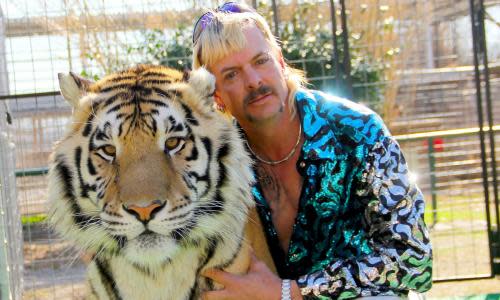Tiger King reflects our world back to us – one run by megalomaniacs and amateurs

I was so close to petitioning our government to include an edict in that pandemic stimulus package to force Netflix to please, for once, create some original programming that isn’t on the spectrum between mediocre to appalling. Our broken and bored populace beseeches you to perform your patriotic duty: entertain us without insulting us.
Related: Tiger King, US president? Trevor Noah explains how Joe Exotic and Trump are the same
Then, out of nowhere, just when we needed it the most, with most of the American populace newly ordered to stay home, Netflix released Tiger King. What first looked like its latest entry in its the long series of impoverished whites exploitation documentaries instead turned out not to be a mere seven-hour trifle, a way to pass the time between fist fights over toilet paper in the Walgreens aisle. No, it turned out to be great art. And like much of our great art, it reflects our world back to us, reveals our hidden realities and our shameful foibles. We are the Tiger King. The Tiger King is us.
Ostensibly this is the story of Joe “Exotic” Schreibvogel, just a simple man with a couple of husbands and hundreds of tigers and other assorted rare animals in a private zoo. His story echoes the classic stories, telling us how power, fame and baby tiger access can warp a once empathetic and kind man into a paranoid and reckless ruler. But it could also be read as the story of how we found ourselves where we are – in lockdown during a pandemic, ruled over by megalomaniacs and amateurs, unable to tell truth from fiction. It shows us how we got here.
This bringing of the wild into our domestic spaces is, after all, what got us sick. Tiger King illuminates this. I don’t just mean how wild animals are exploited and abused for the egotistical and sexual gratification of their “owners” – although feel free to read Tiger King as an allegory, with all of the men on the show using baby tigers to draw potential sexual partners as stand-ins for the way that the slaughter of animals like bears for their supposed aphrodisiac properties in so-called “wet markets” created the conditions for virus transmission from animal to human. You don’t even have to be borderline racist about it, you can compare the conditions in Kansas livestock pens that created the Spanish flu virus of 1918 with the too-small cages Joe kept his chimpanzees in for 10 years.
It allows us to see how we have a society that prioritizes freedom above all else, no matter the damage done. From the men arguing they should be allowed to keep wild animals in unnatural settings despite the potential suffering of the animals and loss of limb and life of the keepers, to the preachers who stubbornly refuse to stop holding services despite the social distancing orders, because if you give up going to church to avoid an illness that causes you to drown in your own fluids, we might as well be living in Russia.
But Tiger King’s most powerful message might be about the people who have been elected and selected to keep us safe, to give wise counsel, and steer us through this crisis. Most true-crime entertainment sings love songs to cops, giving us smart, eager detectives who just can’t get that one unsolved case out of their heads, who will tirelessly pursue truth and justice, no matter how long it takes. These men, and it’s almost always men, will be haggard and aged, so we can imagine all of their hard work and sleepless nights.
Instead, Tiger King shows authorities for how they actually often are: fumbling, inadequate and drunk on power. The detective faced with finding Carole Baskin’s missing husband: well, gee, I don’t know, maybe one day we’ll find something or someone will say something. The prosecutor who may well be relying on the testimony of a liar to ensure the conviction of a defendant: well, golly, he sure seemed credible to me, seeing as how he said exactly the thing I wanted him to say.
What we watched as entertainment we will soon watch as horrifying news programs
I switched between watching Tiger King and the news and it’s like there’s no difference between the two. The lead member of the White House coronavirus taskforce: well, shucks, I sure do think America is doing the best job in the world with testing and treating coronavirus patients. The president who for months insisted the coronavirus was a minor problem until it had spread to the largest number of cases in the world: well, gee whiz, America is the best, we’re doing the best, we’re going to be fine, and hey, why don’t I put my son-in-law with no experience in anything in charge of this. And meanwhile the numbers of diagnosed patients and fatalities just keep spiraling upward.
The pathologies on display in Tiger King – the drive for power, the constant need for more, the willingness to remove any obstacle to what you desire, even by using violence – underlie a society that can’t take care of its sick or poor, that can’t pass regulations that would reduce real suffering. It’s all on show. And what we watched as entertainment we will soon watch as horrifying news programs, as the deaths from the virus increase and overwhelm our broken healthcare system.
But it is perhaps the words of strip club owner, federal informant and alleged con artist James Garretson which resonate the loudest with our moment. “Everybody wants to be the biggest. But no one focuses on being the nicest.” Stick that on all of our tombstones.
Jessa Crispin is the host of the Public Intellectual podcast. She is a Guardian US columnist

